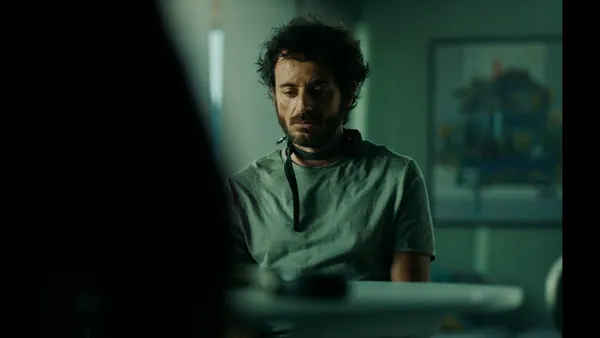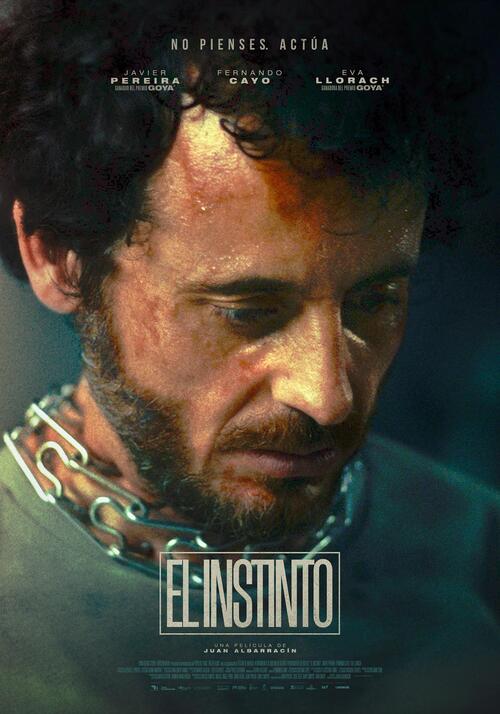Eye For Film >> Movies >> The Instinct (2024) Film Review
The Instinct
Reviewed by: Marko Stojiljkovic

Well, I should have known better… A generic title suggests the lack of imagination, while the plot description mentioning only two characters and sub-genre tropes signals that The Instinct might be a short or, at best, mid-length material stretched more or less clumsily into a feature-length format. A look at the writer-director Juan Albarracín’s filmography that so far only consists of short films confirms the latter fear at least. But, every festival needs a bit of programme filler, and Haapsalu programmers probably decided to use Albarracín’s debut feature for that purpose.
Marketed as a home invasion thriller and structured as a three-act-play in which every part has its own title and introduction, The Instinct starts in an intriguing fashion. We see a seemingly old educational film on the topic of hound dogs and their training. After that, we get to meet our human characters. Abel (Javier Pereira, of Stockholm fame) is an agoraphobic architect who lives somewhere in the arid Spanish countryside. While he jogs on his treadmill, observed by his border collie named Leo, his work and life partner Sonia (Eva Llorach), who acts like his boss, comes back home with the news: they will be selling the property and moving business to Barcelona.

An argument ensues and Leo runs out. Unable to overcome his fears and traumas, Abel fails to search for him beyond the borders of the closest vicinity of the house. Their neighbour José (Fernando Cayo, seen in numerous movies and TV series from The Orphanage to Money Heist) appears on their doorstep informing them that he has accidentally run Leo over. The couple are devastated, but Sonia nevertheless leaves to finalise the moving of the firm, leaving Abel behind.
After the title, the first act titled “Education” unfolds. José comes to Abel’s door and talks his way into the house, offering to make up for Abel's loss. He is a dog trainer, so he could train some of Abel’s dogs for free. Abel does not have any, Leo was his only one and he was a house pet. After a short argument, José comes up with a suggestion of using his skills to help Abel overcome his phobia. As this highly improbable interplay between the Ali Express version of Cesar Millan and his willing human subject progresses through two more chapters titled “Obedience” and “Fetch”, it gets weirder and sicker…
Apart from two relatively brief appearances by the appropriately coldly beautiful Llorach at the beginning and at the very end, the highlight of the film are the intros for the chapters, seemingly taken from the same material, probably archival, as the film’s introduction. However, it pretty much “telephones” in the pun the whole film is centred around, and its stylistic strength also turns to be the movie’s weakness in one additional way. Namely, Albarracín tries to be stylish with the mandatory flashbacks the protagonist has about his trauma in the past, but he simply overdoes the “VHS flavour” of them.
Pereira and Cayo could probably carry a “two-hander” – which The Instinct is – with no trouble, but only if they had something real in their characters to work with. Unfortunately, this is not the case here, so the interplay between the actors also gets hampered by the unlikeliness of the scenario playing out. On a technical level, Iván Emery Arnáiz’ shaky, borderline chaotic camerawork does not help, while there is only so much composer Pablo Serrano can do with his eclectic and tense score. Editor Álvaro Delgado manages to establish some continuity, but he cannot wrestle with predictability and the emptiness of the script to make it appear more interesting than it actually is.
Yeah, the experienced watcher and reviewer should have known better. When it sounds unimaginative and acts like an overgrown short film, it must be an unimaginative, overgrown short film. And it is a pity because The Instinct features some deliciously nasty and vile torture scenes that showcase Albarracín’s craft skills on the singular scene level. But they are not matched by the filmmaker’s ability to see the complete picture.
Reviewed on: 14 May 2025
















